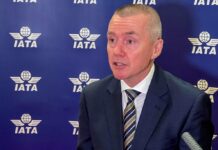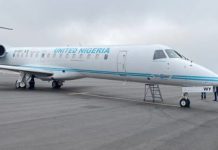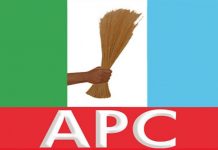The chairman of Air Peace, Mr. Allen Onyema, has reacted to the comment credited to the president of the African Development Bank (AfDB), Dr. Akinwunmi Adesina that African airlines are poorly managed.
Speaking at the World Aviation Forum organised by the International Civil Aviation Organisation (ICAO) in Abuja, Onyema said the AfDB president “is ill-informed about the state of the airlines on the continent.”
Onyema said Adesina’s comment “is capable of affecting insurance premiums paid by African airlines” stressing that “insurance premiums paid on aircraft is quadruple of what legacy airlines pay around the world.”
He contended that the continent’s carriers, especially Nigerian airlines were over-regulated by the Nigerian Civil Aviation Authority (NCAA).
Onyema said on the average, Nigerian airlines pay at least $2.8 million for C-Checks on aircraft while their competitors could carry out such maintenance for a mere $500, 000.
“I disagree with Adesina on that statement because this is impunity the foreign countries hinge on. They tell you Nigeria is unsafe in order to add more insurance premiums for themselves. What I pay as insurance premiums on one aircraft, the legacy airlines of this world would pay it on four aircraft. They tell you Nigeria is unsafe and yet, all of them still scramble to come here. It is what I call international aero politics, which is very bad,” he said.
Onyema said all Nigerian airlines were as safe as their counterparts in Europe and America despite the harsh operating environment in the country.
“I don’t know what the president of AfDB is talking about. Let me tell you something, which you know, NCAA in fact is safety-centric maybe because of the accidents of the past. They hound the airlines into doing the right thing. We are over-regulated by NCAA. What they can allow in America and Europe, NCAA will not allow it here.
“The money we spend to maintain our fleet, the legacy airlines of this world do not spend it. I have never done any C-check that is less than $2.8 million, yet all over the world, people do C-Check with $500,000 because some components that will expire in two or three months are still left on the aircraft because they are very close to the source of materials, unlike here that we have to do everything at a go,” he said.
He warned that high charges and taxes on operating airlines in the continent would cripple carriers in Africa.
He lamented that operators on the continent especially Nigerian airlines pay spurious taxes and charges to government agencies, state governments and organizations.
Unlike other parts of the world where airlines are given leeway to boost their operations, Onyema said the contrary is the case in Nigeria, nay Africa.
He said most of government officials were unfriendly with private investors in the country, saying rather than helping businesses to grow, they contribute to their early demise.
“You will recall that the Nigeria Customs Service (NCS) hit Air Peace barely five days after we commenced our operations as a young airline and sealed our premises. They claimed that we didn’t pay customs duty for an aircraft that was yet to arrive in Nigeria. That would tell you that civil servants are yet to understand how businesses work. In Nigeria, civil servants are very wicked.
“Unless the civil service in this country understands that investors must be helped to create jobs and put food on the table of so many people, we will continue to have this issue of insecurity because some people are jobless and they will be opened to social vices.
“Excess taxation is one of the banes of our aviation industry; it is one of the things that stunt our growth in this part of the world and except that is addressed, nothing will happen. But, in order to address that, the Federal Government set up a tax force in which I am a member to look into the issue.”
Onyema also condemned multiple designations granted foreign airlines in Nigeria, stressing that this was affecting the finances of the local airlines.
He also warned against Nigeria’s quick implementation of the Yamoussoukro Declaration (YD) of 1999 stressing that Nigeria has a lot to lose in the policy than any other African country.
























































